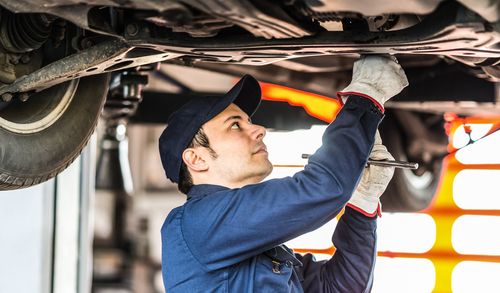As an essential component of your vehicle's drivetrain, the differential is responsible for allowing the wheels to rotate at different speeds, ensuring smooth turns and overall safe operation. However, over time, the differential can experience wear and tear, leading to a variety of issues that can affect your vehicle's performance and safety. Regular maintenance and inspections of the differential can help prevent potential issues and ensure its properly functioning. It is recommended to follow the manufacturer's recommended maintenance schedule and have a professional mechanic check the differential during routine inspections.
What Does the Differential Do?
The differential is responsible for transferring power from the engine to the wheels, allowing your vehicle to move forward. The differential system is designed to enable the wheels to rotate at different speeds depending on the angle of the turn. This helps prevent excessive wear and tear on the tires and other drivetrain components, ensuring your vehicle's longevity and performance. Some additional functions of the differential system include:
- The differential system distributes torque evenly to the wheels, allowing for optimal traction and stability on various road surfaces, such as ice, mud, or gravel.
- The differential helps to reduce tire slippage by distributing power to the wheels with the most traction, preventing skids and spinouts.
- By enabling the wheels to rotate at different speeds, the differential system reduces stress on the tires, helping to prolong their lifespan and save on replacement costs.
- The differential system is also essential for vehicles with all-wheel or four-wheel drive, as it allows for power to be distributed to all wheels, ensuring better off-road capabilities and traction in adverse weather conditions.
Signs You May Have Differential Issues
One of the most common signs of differential issues is a whining noise coming from your vehicle's rear end. This sound normally is most noticeable when turning, as the differential gears wear unevenly over time. If you notice any unusual vibrations or difficulty steering, it may indicate a problem with your differential system. A clunking sound when shifting gears may also be a sign of differential issues, as it may indicate worn-out bearings or gears.
Benefits of Professional Differential Repair
If you suspect an issue with your vehicle's differential system, it is essential to seek professional assistance. Our professional auto repair shop can diagnose and repair differential issues using state-of-the-art equipment and diagnostic tools to ensure accurate and reliable service. A professional differential repair service can provide several benefits, including improved vehicle performance, increased safety, and better fuel economy. A well-functioning differential system can help your vehicle accelerate more smoothly, steer more precisely, and reduce wear and tear on the tires and other drivetrain components. Additionally, a properly functioning differential can help you save money on fuel costs by improving your vehicle's overall efficiency.

